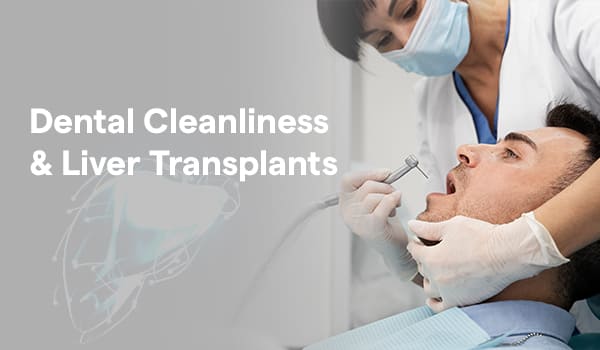
While undergoing a liver transplant the rate of contracting infections increases to several folds due to intake of immunosuppressive drugs. These medicines contribute to suppressing the immunity system of an individual thus, small, insignificant infections that any healthy person could overcome easily become lethal in transplant patients. Many species of bacteria colonize the mouth, most of which are harmless, yet bad oral hygiene facilitates the overgrowth of opportunistic bacteria that contribute to infections like gingivitis and periodontitis. This forms a portal of entry for the microorganisms into the host circulation leading to bacteremia sepsis after liver transplants.
The weak immune system of the patient due to immunosuppressive drugs makes it tough to fight these infections that put the life of the patient in danger.
Patients with poor oral health develop dental problems such as gum disease, which is a chronic inflammatory disease and one of the major issues that liver transplant patients face during the treatment.
Almost all liver transplant patients are required to take a complex regimen of medications, most notably immunosuppressants (anti-rejection drugs). Some of these medications can create side effects that involve oral health. As some immunosuppressant drugs lead to gingival overgrowth and excessive growth of gum tissues which further complicates the liver transplant procedure. The antibiotics prescribed by the doctor may interact with the immunosuppressive medicines to increase or decrease their effect. By maintaining good dental hygiene patients might not need any antibiotics and hence, can avoid the chances of drug interactions.
Attention to dental hygiene begins early before the transplant surgery. Most of the liver transplant hospitals in India evaluate the patient thoroughly and all patients must undergo dental examination before any organ transplant as a part of the pre-transplantation evaluation.
Untreated dental problems like cavities or abscesses could become sources of infection post-transplant when the patient's immune system is suppressed. Such complications, if managed ahead of time, significantly decrease the risks of post-transplant issues.
Apart from the medical perspective, good dental hygiene could play an enormous role in ensuring a quality life post-liver transplant. This is because oral health issues may give rise to pain, eating difficulties, and shyness, all detriments to the improved quality of life afforded by a successful liver transplant.
Finally, regular dental checks can allow for early detection of oral cancers, quite relevant to transplant patients who are at an increased risk for some forms of cancer due to chronic immunosuppression.
Liver transplant in India is preceded by guidance from a liver transplant surgeon for maintaining overall dental hygiene. These liver transplant recipients have a high risk of oral conditions (fungal infections). Dental cleansing must be followed by flossing to remove plaque and food particles from the gaps in the teeth. Regular dental checkups and follow-ups from dentists are advised. Before any procedure for an organ transplant, the dentist must be informed about all the medications. If signs of infection such as swelling, pain, or fever occur, seek dental care immediately.
The transplant team is very instrumental in emphasizing dental cleanliness. Patients should be advised on the relationship between oral health and transplant success and how to coordinate care with dental professionals who have experience treating transplant recipients.
Some transplant centers have dedicated dental teams dealing specifically with transplant patients. Such specialists can help patients by giving them individual advice and treatment plans, bearing in mind the history of illnesses and medications currently being used.
Dental cleanliness is a critical yet overlooked factor in the care of liver transplant patients. It would help in preventing infections, reducing inflammation, avoiding complications with medications, and thus contribute to an improved quality of life. Keeping good oral hygiene and regularly visiting a dentist for check-ups, therefore, shall go a long way toward making a significant contribution to the long-term success of the transplant and thereby to their health in general.
It just reflects that risks of bad oral health and related complications following liver transplantation reinforce the concept of an integrated approach to healthcare. For patients on the threshold of liver transplantation, indeed a healthy mouth goes a long way toward the new liver and can imbibe life into the transplant process. At the best liver transplant hospital in Delhi, Sir Ganga Ram Hospital patients are provided with detailed information about the costs of the transplant process, including pre-operative testing, surgery, hospital stay, medications, and follow-up care. For more information, book an appointment.